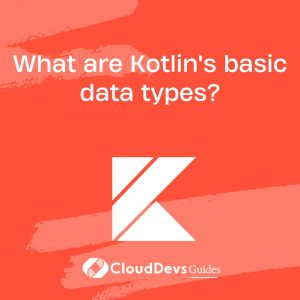What are Kotlin’s basic data types?
Kotlin provides a rich set of built-in data types to represent different kinds of values and entities in a program. These basic data types serve as the building blocks for defining variables, constants, and expressions, and they play a crucial role in performing various operations and computations within a Kotlin program.
The basic data types supported by Kotlin include:
Byte: Represents 8-bit signed integers ranging from -128 to 127.
Short: Represents 16-bit signed integers ranging from -32768 to 32767.
Int: Represents 32-bit signed integers ranging from -2^31 to 2^31-1.
Long: Represents 64-bit signed integers ranging from -2^63 to 2^63-1.
Float: Represents 32-bit floating-point numbers with single-precision.
Double: Represents 64-bit floating-point numbers with double-precision.
Boolean: Represents boolean values, which can be either true or false.
Char: Represents single 16-bit Unicode characters.
These basic data types allow developers to store and manipulate different kinds of values, such as numbers, characters, and boolean values, within their Kotlin programs. Additionally, Kotlin provides support for literals and expressions to initialize variables of these data types, making it easy to work with numerical and non-numerical values in Kotlin code.
In addition to the basic data types mentioned above, Kotlin also provides support for arrays and strings, which are composite data types used to represent collections of values and sequences of characters, respectively. Arrays allow developers to store multiple values of the same type in a single variable, while strings enable manipulation and processing of text-based data within Kotlin programs.
Kotlin’s rich set of basic data types provides developers with the flexibility and versatility to represent and manipulate different kinds of data in their programs, enabling them to build robust, efficient, and maintainable software solutions across various domains and platforms.








